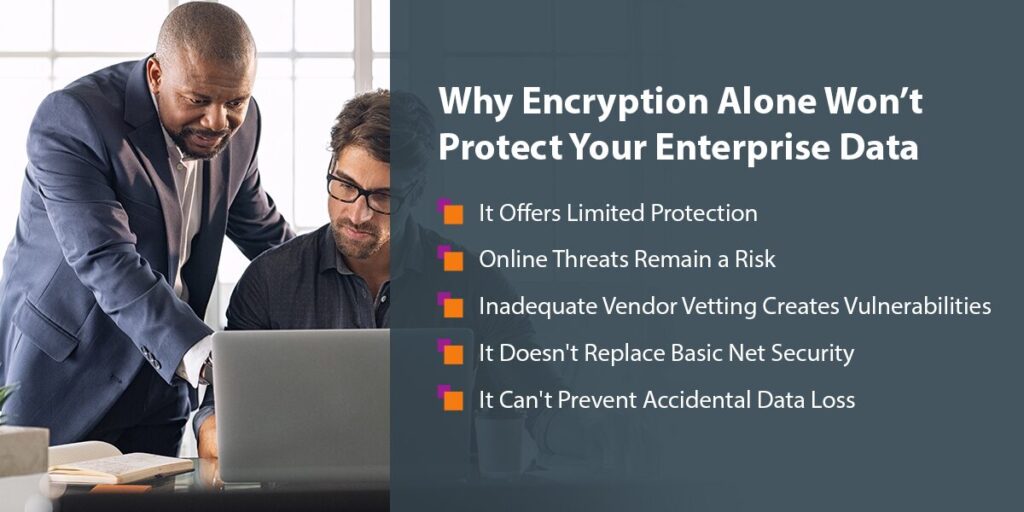With a continuing increase in cybercrime, businesses have turned to encryption to protect themselves and their data online. Recently, high-profile data breaches have added a sense of urgency for enterprises to ensure their employees are taking preventative action as part of their day-to-day business. Should businesses fail to implement procedures to safeguard the data of their enterprise and customers, they may be subject to fines, bad publicity and a lack of trust amongst customers.
To protect personally identifiable information (PII) and personal health information (PHI) while it is transmitted from one system to another, businesses often implement a secure messaging and document exchange solution. Those requiring seamless secure exchange capabilities within their workflows may integrate a solution, such as DataMotion’s secure message center to enable compliance while not compromising the user experience.
However, using encryption is not always enough to protect your business from malicious attackers. In this blog post, we’ll cover the reasons why a robust data security plan that extends beyond just encryption and other software solutions is important to keep your enterprise data safe.
Is Encryption Safe if Using a VPN?
Security services such as a Virtual Private Network (VPN) encrypt your internet connection. Some businesses believe relying on a VPN alone offers enough protection because it uses a type of encryption to encode data. While VPNs are often a crucial component of data privacy and safety, they are far from comprehensive. In fact, some countries regulate, or even ban, VPN usage, leaving businesses that operate in those areas without a VPN component entirely.
VPN encryption adds an extra layer of protection for browsing activity and sent or received files, and it’s ideal for businesses working with a distributed team or remote employees. That said, even businesses with the most robust VPN membership are still vulnerable to threats such as:
- Malware, spyware, and viruses
- Phishing schemes
- Compromised files and websites
- Unauthorized server access
- Online hacking
- Account mismanagement
- Unsecured data storage
- Data loss through natural disasters

Encryption Alone Won’t Protect Your Enterprise Data
Your business can (and should) use encryption to protect sensitive information and confidential communications. But this should be part of a larger strategy. If a cybercriminal finds a vulnerability somewhere along the data transmission path, or by getting their hands on your data encryption keys, your encrypted enterprise data can still be hacked and your systems compromised.
Below are five reasons why encryption as a sole line of defense isn’t enough to protect your enterprise data:
1. Limited Protection
Encryption converts data into ciphertext, which usually prevents hacker access to it in the first place. Though they can try to bypass it, a high level of encryption, such as AES 256-bit, will provide a strong layer of protection that can take several years to crack. Most software (including DataMotion’s pre-built solutions and APIs) utilizes AES 256-bit encryption.
Can encrypted data be hacked? Yes, even strongly encrypted data can be compromised. While high-level encryption like AES 256-bit provides robust protection that’s difficult to crack directly, hackers typically bypass encryption by targeting other vulnerabilities: stealing encryption keys, exploiting implementation flaws, using social engineering, or attacking unprotected endpoints where data is decrypted. Encryption protects specific assets but cannot prevent all security threats.
Email is particularly vulnerable as it can be intercepted and read. Most services, including popular ones such as Google, can’t guarantee their email is encrypted from every angle.
For example, if you are sending mail from one Gmail account to another Gmail account, great; if you’re sending it “out of network,” Google’s encryption no longer works. There are a number of solutions available to help here. Third-party services, such as those that use SafeTLS, help fully encrypt your email messages, something you won’t find included as a default in just regular old email. Other, more robust and integrable services, such as DataMotion’s secure message center, are available to build secure exchange into an enterprise’s workflows so you can easily and efficiently send sensitive data at scale.
Encryption is a roadblock for hackers, but not a door to a vault–they will simply find another way inside. It’s important to understand that using encryption is still helpful, but you’ll also need to use other methods to prevent data breaches to protect yourself online.
2. Online Threats Remain a Risk
Encryption and a VPN can protect you against malware that is injected onto your device by a hack via your internet connection, but it doesn’t safeguard against clicking on malicious hyperlinks or inadvertently leaving your accounts open to attacks. You still need to avoid visiting risky sites and downloading potentially harmful files.
In a 2021 survey, more than half of the respondents with known data encryption issues cited unencrypted cloud services as a significant part of the problem. For businesses that rely on the cloud for data storage and communication, inadequate encryption could be a costly oversight.
It’s also easy to forget that mobile devices are at risk. There are apps available to encrypt your internet connection and files, but accessing the internet on a mobile device poses the same risk it would as if you were on a regular computer.
3. Inadequate Vendor Vetting Creates Vulnerabilities
Even if you encrypt your internet connections and use caution when visiting websites and downloading files, the risk of a data breach remains. The threat may even lie with your vendors. Take the recent SolarWinds breach for example. A hacker injected malicious code into the vendor’s software update, the update was released, and once the update was deployed a hacker was able to walk right into the systems of a SolarWinds’ customer and steal their data.
Ensuring your vendors take proper precautions to protect their systems is one way to reduce the risk of this type of attack. For instance, DataMotion takes a zero-trust approach to security and uses military-grade encryption to secure your data in motion and limit access to only those people and systems who require it.
Read more about the SolarWinds breach, as well as how to protect yourself from ransomware.
4. It Doesn’t Replace Basic Net Security
Even though complete immunity from cyberattacks doesn’t exist, learning about basic net security is likely to keep you much safer compared to the average internet user. When you are aware of the risks of completing certain tasks and know how to spot subtle details, you’ll eventually be able to notice suspicious ads, websites, links, messages and scams in advance.
If you’re running a business, be sure to train your employees so they can also help prevent cyberattacks. Having your employees properly educated on internet security is especially important if they have access to customer data or any devices that contain personal information of any kind. Update training materials and have ongoing awareness plans to keep your team up to date on emerging security risks, especially any that are trending in your specific industry. While you’re at it, take the time to review your current security infrastructure. Remember that security that is complicated won’t get used. If your current security measures are difficult to navigate or disrupt workflows, employees may bypass them, even if they’re aware of the risks.
Consider installing an anti-virus program if you don’t already have one, as it will allow you to scan for malware and remove it. It would be a good idea to use other security software as well, particularly ones that serve different purposes, so you have a higher level of protection overall.
You should also make sure you keep your encryption keys safe — many businesses make the mistake of storing this information on an unsecured server, like an unencrypted cloud platform, or keeping them in the same place as sensitive data.
5. Encryption Can’t Prevent Accidental Data Loss
Human error continues to play a pivotal role in data loss across industries. In fact, an IBM study found that it is a major factor in 95% of data breaches. No matter how highly-encrypted your data is, it is still susceptible to being transmitted to the wrong recipient via email, or otherwise shared via incorrect attachments or unsecured encryption keys.
Pairing encryption with other security and privacy tools, such as a content filter that detects (and then, in some cases, encrypts) sensitive information, and having a detection and escalation plan in place for accidental data misuse is most effective.
Get Tips, Tricks & Techniques Delivered Once a Month
Subscribe to the DataMotion Newsletter and be the first to know the latest news about DataMotion, industry trends, and best practices surrounding secure exchange.
How to Protect Your Business Against Online Threats
We’ve established why it isn’t possible to stay protected with encryption alone — so what can you do to keep your enterprise, employee, and customer data safe?
Some of the larger, common risks include data being leaked and deleted from your device and database, accounts being compromised, your device being affected by malware, and identity theft because of leaked information. A few basic ways you can keep yourself safe — other than using security software — include:
- Develop safer online habits. Be cautious when clicking on links and ads. Before clicking, hover your mouse over the URL to see what page it really links to. Keep an eye out for subtle differences in the text and appearance of sites or emails as well, since there are a lot of ways an individual can be easily tricked into handing over personal information. And be careful what you share on social media, don’t overshare personal information that may be used in your password or security questions. Finally, avoid storing passwords on your web browser and log out of your accounts when you’re done using them.
- Secure your accounts with strong passwords. An ideal password is a combination of numbers, uppercase and lowercase letters, and symbols. Your passwords should exclude any personal information, single words found in the dictionary, and anything that could be linked to your identity. Avoid reusing passwords—this makes it easier for hackers to access more than one of your accounts if you’re using the same password for multiple logins.
- Use multi-factor authentication for added security. A strong password isn’t always enough. If a hacker guesses your password or steals it from another source, they will gain access to any accounts with that same password. Multi-factor authentication requires employees to complete an extra step to verify their identity after entering their password. This may include steps such as entering a one-time code sent to their email or cell phone or using an authentication app on their smartphone. Along these lines, ensure that your software vendors support multi-factor authentication so you can secure those systems as well.
- Pay attention to news about internet security. If there is a common scam going around, you’ll likely hear about it. Set up online notifications, such as a Google Alert, to notify you whenever there is a new data breach or scam in the headlines. When a new event occurs, you’ll be notified via email right way so you can quickly take the appropriate actions to secure your systems.
Connect and Exchange Data Securely with DataMotion
An encrypted connection can keep hackers out; it can also keep your email from being read if intercepted. But encryption cannot prevent human error, such as manually downloading malware—or preventing your account from being stolen by cybercriminals if you do.
There’s no doubt that encryption can be helpful in protecting your privacy and data at the very least, but a robust, multi-layered approach to security is often the best choice. Most of all, you will have to do your part to keep yourself (or your business) safe, and that means knowing what to look for and avoid.
A secure messaging platform that complies with industry standards and protects data while at rest and in transit helps mitigate the risk of a data breach while simplifying your workflow. Our suite of pre-built solutions, APIs and no-code solutions offer easy-to-use and highly secure, top-level protection without the need for encryption keys. Your team gets better visibility and control, and you get peace of mind knowing that your sensitive business and customer data is safe and secure.
Explore our industry-specific services to learn more, or contact our team of security experts to see how DataMotion services can help streamline and secure your day-to-day enterprise operations.
Want to learn more about securing your communications?
Schedule a demo with our sales team today.




